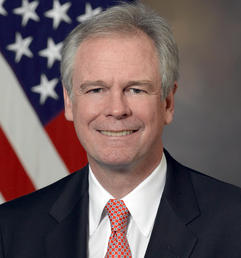
Dorrance Smith, a former ABC News producer, has been close to Dick Cheney and Donald Rumsfeld since the Ford Administration. Which probably explains why the Bush administration picked him to be assistant secretary of defense for public affairs.
In November 2005, shortly after President Bush nominated him for the post, Smith wrote an op-ed for the Wall Street Journal claiming American television networks—including Fox News—had an “ongoing relationship” with the pan-Arab news network Al-Jazeera. That prompted Senator Carl Levin, then the ranking member of the Senate Armed Services Committee, to put a hold on Smith’s nomination. Smith, Levin said, believed that “Osama bin Laden, Abu Musab al-Zarqawi, and Al Qaeda have a partner in Al-Jazeera and, by extension, most networks in the U.S.” And such a person, Levin reasoned, should not be given a senior Pentagon press-relations job.
But the Bush Administration had other plans, and Smith was named to his job in a recess appointment in February 2006. Recess appointments are the Bush Administration’s preferred method for installing hacks into key positions (see John Bolton), and Smith hasn’t disappointed: even though he heads an agency that is meant to be the main liaison between the Pentagon, the media, and the American public, he has, we’re told, yet to hold a single press briefing.
Several journalists who cover the Pentagon – all asked that their names not be used, for obvious reasons — said that Smith rarely speaks to reporters at all. “I‘m not really sure how he fills his day, [but] it’s not helping us,” said one reporter of Smith. Another said that Smith’s predecessors in the Bush Administration, Torrie Clarke and Larry Di Rita, had their faults, “but you could go to them for help and for information. We see the cleaning lady more than Dorrance.”
The stated mission of the Public Affairs office is to provide accurate information to the media and the public. But Smith’s aim seems to be to turn his office into a political spin operation that serves the White House. For example, he posted “Five Myths About the War on Terror” on a Defense Department website, a document greatly lacking in facts. Two of the “myths” he seeks to debunk: that “Secretary Rumsfeld ignored military advice to increase troop levels in Iraq,” and that “the administration has been distracted from waging an effective war in Afghanistan by Iraq.”
Smith has also sought to turn the Early Bird—a daily collection of articles on defense and national security issues assembled by the Pentagon—into what one reporter called “an in-house propaganda rag.” Smith has used the Early Bird to circulate letters he has written to newspapers that criticize media outlets for allegedly misreporting the situation in Iraq. (Apparently some of these letters were so ridiculous that no newspaper would publish them.) Smith also created a rapid-response team of administration loyalists who craft emergency spin on news stories that don’t reflect well on the war effort.
Many defense reporters now routinely bypass Smith’s office, knowing there’s no chance of getting anything other than the party line, and seek information instead from the press offices of the individual military branches and the Joint Chiefs of Staff. And, last month, former ABC correspondent Geoff Morrell was installed as a Pentagon spokesman and on-camera briefer—perhaps because even the Pentagon itself is embarrassed by Smith’s refusal to do his job.


